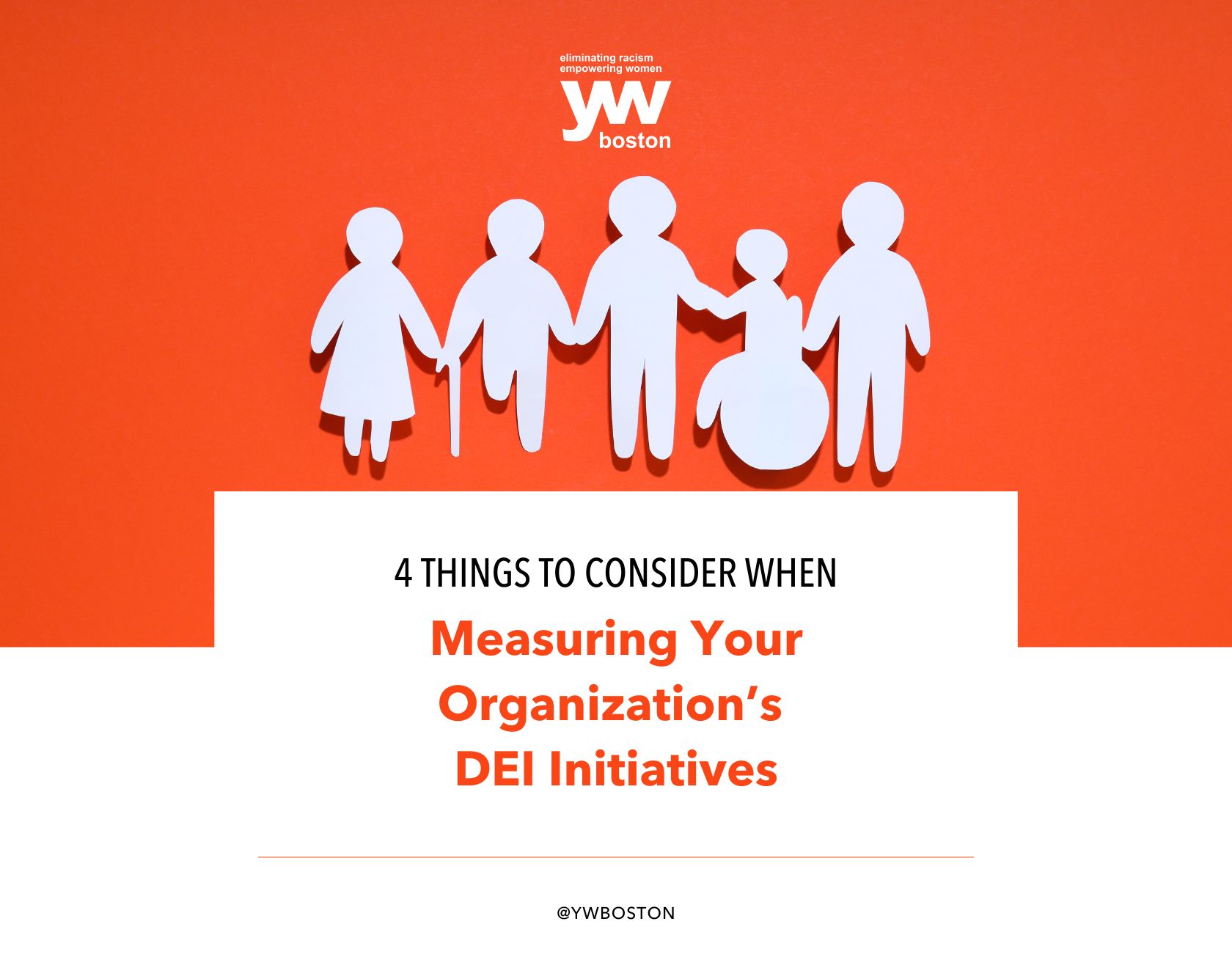
June 29, 2021
4 things to consider when measuring your organization’s diversity, equity, and inclusion initiatives
Scholars, business leaders, and Diversity, Equity & Inclusion (DEI) professionals have stressed the importance for companies to measure their DEI efforts as intently as they measure any other key performance- and business-related indicators. Achieving greater DEI is a complex process that requires change in various dimensions—policies, practices, attitudes, and behaviors. YW Boston understands that, in order to create lasting results, we must affect changes in people’s attitudes and behaviors regarding social identities, such as race and gender, in combination with supportive policies and practices& that lead organizations to be more inclusive.
YW Boston’s DEI Services focus on change at three levels: micro (changes to an individual’s knowledge, attitude, behavior, and self-concept,) meso (changes in cultural and interpersonal interactions,) and macro (changes in the policies and practices of institutions and communities.) Yet no matter the specific approach to DEI, the process requires a long-term commitment and careful evaluation. Business leaders understand that that which is not measured, cannot be properly tracked or reassessed, and ultimately, it cannot be prioritized.
Define your scope and purpose
Gathering data for the sake of it may end up causing more harm than good. Particularly when soliciting information about personal experiences of power, privilege, and discrimination; and social identities such as race, gender, age, ability, sexual orientation, religion, class, immigrant status, and so on. So, the first step is to identify your unique diversity, equity, and inclusion metrics and why you would like to track them. These metrics should help your organization identify priority areas, set goals, measure impact, motivate staff and leadership, and stay accountable.
Establish your own unique baseline
At YW Boston, we take a careful and comprehensive approach to evaluation given the sensitivity of the information involved with DEI work. For instance, evaluation is integral to every part of InclusionBoston. In order to best identify the strengths and potential of both individuals and organizations, we collect data throughout each stage in the InclusionBoston process: pre-Dialogues, during Dialogues, and post-Dialogues. Measuring a baseline allows us to better understand who has signed up to do this work. Knowing both who is entering this work and how, allows us to finetune our curriculum, facilitation styles, action plan support, and other elements of our partnership to best serve the partner organization’s growth potential. Subsequent evaluations allow us to better understand what change towards DEI looks like across the board.

Gather meaningful metrics that go beyond diversity
Organizations can be tempted to measure what is most accessible or visible. While this can be a good starting point, solely evaluating superficial diversity metrics will make space for ongoing inequities within the organization. For instance, tracking the diversity of new hires without measuring their engagement, promotion, pay, and retention within the organization does not tell the full story, leaving room for inequitable consequences. A part of this process is to understand deeply the implications and differences between diversity, inclusion, and equity. Another important point is that organizations should think about data intersectionally. This means not just thinking about promotion rates for Black employees, for instance, but promotion rates for Black employees within different departments and with other intersecting social identities such as Black women, queer Black employees, and so on.
Account for bias in your evaluations
Evaluations can provide essential data about the progress of your diversity and inclusion efforts. They are also a valuable tool that will inform any adjustments, should you need to course correct. Yet bias often shows up in evaluations, and when it comes to evaluating racial equity, this unaddressed bias can jeopardize the success of your efforts of improving diversity, equity, and inclusion in the workplace. Check out this article to learn ways to identify and mitigate bias in your evaluations: Your evaluations are likely biased. Here’s what you can do about it.
___
About YW Boston
As the first YWCA in the nation, YW Boston has been at the forefront of advancing equity for over 150 years. Through our DE&I services—InclusionBoston and LeadBoston—as well as our advocacy work and F.Y.R.E. Initiative, we help individuals and organizations change policies, practices, attitudes, and behaviors with a goal of creating more inclusive environments where women, people of color, and especially women of color can succeed.
Whether your organization is large or small, you’re just starting out with DEI, or are further along on the journey, YW Boston will work with you to find the right solutions. YW Boston offers a variety of DEI Services designed to create lasting change. For more information, please contact Sheera Bornstein at sheera@ywboston.org.
About InclusionBoston
InclusionBoston advances diversity, equity, and inclusion by partnering with organizations looking for improved results. Using our advanced assessment tool and the latest research on behavioral and organizational change, we partner with organizations to create an action plan and provide them with the resources needed to drive lasting change. Our customized, evidence-based approach builds internal capacity and promotes cultural change while supporting organizations throughout their journey. YW Boston also offers one-day workshops where participants explore frameworks, develop knowledge, and engage in dialogue.
Ready to unlock the power of diversity in the workplace? Click here to learn more about InclusionBoston and request your free consultation.

